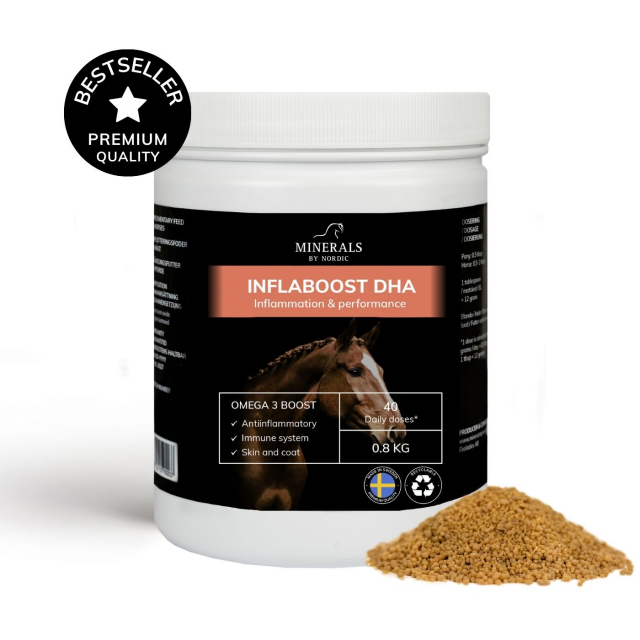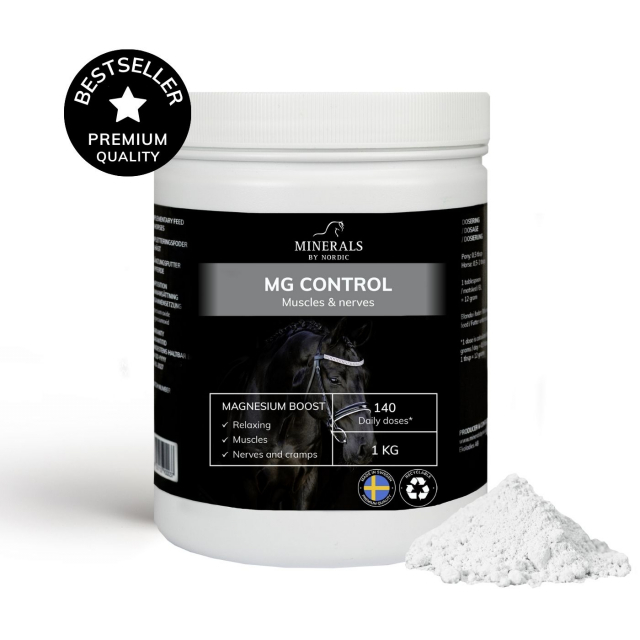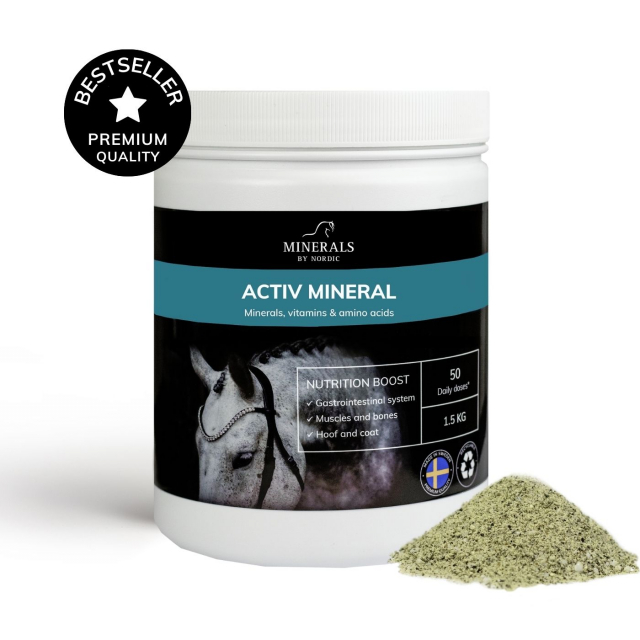
Tips for laminitis prevention
How to prevent laminitis
Laminitis/founder is a serious illness that affects horses' hooves. It is an inflammation of the hoof lamellae, which are the thin layers of tissue that connect the outer harder part of the hoof with the inner skeletal part. When these lamellae become inflamed, it can lead to severe pain and in some cases, damage to the hoof's structure to the extent that it can no longer properly support the horse's weight. How can one then prevent the horse from developing laminitis?
Why does the horse develop laminitis?
There are various causes of laminitis, including overloading through too much hardfeed, especially those rich in carbohydrates, sudden changes in diet or environment, serious infectious diseases, and prolonged use of certain medications. Stress, overweight, and lack of exercise can also increase the risk of developing laminitis. Symptoms of laminitis include tenderness in the hooves, difficulty moving, a pulse and warmth that can be felt in the hooves, and in severe cases, rotation of the coffin bone. The treatment of laminitis focuses on relieving pain, treating the underlying cause, and restoring hoof health. This may include changes in diet, strict rest, as well as medical and in some cases surgical intervention.
Why does the horse develop laminitis?
There are various causes of laminitis, including overloading through too much hardfeed, especially those rich in carbohydrates, sudden changes in diet or environment, serious infectious diseases, and prolonged use of certain medications. Stress, overweight, and lack of exercise can also increase the risk of developing laminitis. Symptoms of laminitis include tenderness in the hooves, difficulty moving, a pulse and warmth that can be felt in the hooves, and in severe cases, rotation of the coffin bone. The treatment of laminitis focuses on relieving pain, treating the underlying cause, and restoring hoof health. This may include changes in diet, strict rest, as well as medical and in some cases surgical intervention.

How to Prevent Laminitis in Horses?
Preventing laminitis is crucial and involves maintaining a healthy weight for the horse, careful monitoring of feed intake, regular exercise, and paying attention to signs of stress or illness. Regular contact with a veterinarian and farrier is also essential to maintain hoof health and prevent laminitis.
The Importance of Diet in Preventing Laminitis
A well-balanced diet is fundamental to preventing laminitis in horses. It's important to tailor the feed to the horse's age, weight, health status, and activity level.
Proper Care and Environment
A proper care routine and an adapted environment are also crucial factors in keeping your horse healthy and preventing laminitis.
Exercise and Activity Level
Regular exercise is vital for the horse's overall health and for preventing laminitis. Exercise helps maintain a healthy weight, promotes blood circulation to the hooves, and contributes to a healthy metabolism.
Feeding Tips for Sugar-Sensitive Horses
Activ Mineral - All horses need mineral supplements. Activ Mineral is free from sugar and grains.
Inflaboost DHA - Omega-3 fatty acids offer several health benefits for sugar-sensitive horses, including reduced inflammation and improved insulin resistance, which are important for managing conditions like laminitis and metabolic syndrome. They can also help maintain a healthy weight and promote hoof health, contributing to overall better health for the horse.
Mg Control - Magnesium supplements can help relieve muscle tension and discomfort while improving insulin resistance. It also plays a crucial role in energy metabolism, supporting a healthy weight and reducing the strain on the hooves. Additionally, magnesium is necessary for strong bone and hoof structure by supporting calcium absorption.
Preventing laminitis is crucial and involves maintaining a healthy weight for the horse, careful monitoring of feed intake, regular exercise, and paying attention to signs of stress or illness. Regular contact with a veterinarian and farrier is also essential to maintain hoof health and prevent laminitis.
The Importance of Diet in Preventing Laminitis
A well-balanced diet is fundamental to preventing laminitis in horses. It's important to tailor the feed to the horse's age, weight, health status, and activity level.
- Limiting sugar and starch intake: High sugar and starch content in feed can increase the risk of laminitis. Therefore, choose feeds with low sugar and starch content and limit the amount of hardfeed. We recommend completely grain and molasses-free feed. The Höveler Pur series is therefore an excellent option.
- Fiber-rich diet: A diet rich in fiber from hay and grass is essential. Fiber stimulates chewing and saliva production, which is important for healthy digestion and preventing metabolic-related diseases. For sensitive horses, it's important to monitor grass intake, introduce the horse gradually, and be extra cautious when the grass is most rich in sugar.
- When is grass most rich in sugar? The sugar content of grass varies throughout the day and is influenced by several factors such as the intensity of the sun, temperature, and the growth phase of the plant. Generally, grass has the highest sugar content during the late afternoon and early evening, after a day of intense sunshine. This is because photosynthesis is more active on sunny days, causing the grass to produce more sugar. During the night, the grass uses some of this sugar for its growth, resulting in lower sugar content in the morning. It's also important to note that sugar content may be higher in grass during late spring to early summer when the grass is growing rapidly. During colder periods, especially after a frosty night followed by sunny days, grass can also accumulate high levels of sugar. This is because the cold inhibits the growth of grass and the use of sugar, leading to the accumulation of sugar in the plant. For horse owners concerned about laminitis and other metabolic problems, it's wise to be cautious about grazing during these times of day and under these specific weather conditions to avoid high sugar intake.
Proper Care and Environment
A proper care routine and an adapted environment are also crucial factors in keeping your horse healthy and preventing laminitis.
- Regular hoof care: Ensure your horse receives regular and professional hoof care. Proper trimming and possibly shoeing can prevent biomechanical problems that can lead to laminitis.
- Stress management: Stress can be a triggering factor for laminitis. Try to create a calm and stable environment for your horse, with regular routines and minimal disturbances.
Exercise and Activity Level
Regular exercise is vital for the horse's overall health and for preventing laminitis. Exercise helps maintain a healthy weight, promotes blood circulation to the hooves, and contributes to a healthy metabolism.
- Customized training plan: Design a training plan tailored to the horse's age, condition, and any health problems. Gradually increase the intensity to avoid overexertion.
- Varied training: Include a mix of different types of exercises in the training program, such as walks, lunging, and riding on varied terrain to improve hoof health and prevent injuries.
Feeding Tips for Sugar-Sensitive Horses
Activ Mineral - All horses need mineral supplements. Activ Mineral is free from sugar and grains.
Inflaboost DHA - Omega-3 fatty acids offer several health benefits for sugar-sensitive horses, including reduced inflammation and improved insulin resistance, which are important for managing conditions like laminitis and metabolic syndrome. They can also help maintain a healthy weight and promote hoof health, contributing to overall better health for the horse.
Mg Control - Magnesium supplements can help relieve muscle tension and discomfort while improving insulin resistance. It also plays a crucial role in energy metabolism, supporting a healthy weight and reducing the strain on the hooves. Additionally, magnesium is necessary for strong bone and hoof structure by supporting calcium absorption.

 SWE
SWE


 ENG
ENG NO
NO AX
AX DE
DE